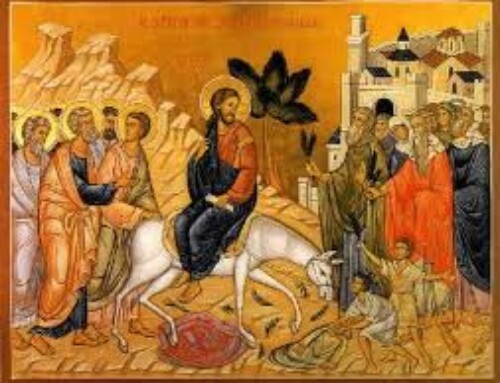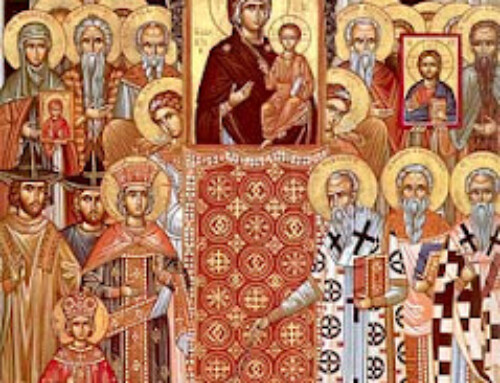The Liturgy
of the Presanctified Gifts
Because of its paschal character, the normal Divine Liturgy is not served on weekdays of Great Lent in the Orthodox Church. In its place, so that the faithful would not be left without Holy Communion, the Liturgy of the Presanctified Gifts is served.
The practice of serving the Presanctified Liturgy during Great Lent is an ancient practice witnessed to by the following canon of the church, which cer?tainly bears witness to a piety of a much earlier date.
On all days of the holy fast of Great Lent, except on the Sabbath (i.e., Saturday), and the Lord’s Day (i.e., Sunday), and the holy day of the Annunciation, the Liturgy of the Pre?sanctified Gifts is to be served. (Canon 52, Quinisext Council, 692 A.D.)
At present, the Liturgy of the Presanctified Gifts is prescribed for Wednesday and Friday evenings during Great Lent. This liturgy is the solemn Lenten Vespers with Holy Communion added to it. The Communion is received from the Sacramental Gifts of bread and wine offered and sanctified at the Divine Liturgy of the previous Lord’s Day, hence its name of the Liturgy of the Presanctified Gifts.
PREPARATION OF THE GIFTS
At the Lord’s Day Liturgy, the priest prepares a “lamb” (the bread which becomes Christ’s Body at the Divine Liturgy), which is then consecrated together with the wine and is kept for the Presanctified Liturgy. On the evening when this liturgy will be served, the Lenten Vespers begins in the usual way. During the chanting of the psalms (kathisma), after the Great Litany, with prayer and incensing, the priest places the Presanctified Gifts on the diskos. He carries them in solemn procession around the back of the altar table to the table of oblation.
HYMNS AND READINGS
After the singing of the evening psalm, Lord I call upon Thee, with the special hymns for the given day, the evening entrance is made and the hymn Gladsome Light is chanted. There then follow the two readings proper to Lenten Vespers, from Genesis and from Proverbs. Between these two readings, with their prescribed prokeimenon verses, the celebrant blesses the faithful with the censer and a lighted candle proclaiming: The Light of Christ illumines all! This blessing symbolizes the light of Christ’s resurrection, which illumines the Old Testament scriptures, and the entire life of man, the very Light with which Christians are illumined the life of the Church through holy baptism.
After the singing once more of the evening psalm, Let my prayer arise in Thy sight as incense, the
prayer of Saint Ephraim is read and the augmented litany is chanted. Then the Presanctified Gifts are brought in solemn, silent entrance to the altar table with singing of the special entrance hymn:
Now invisibly the heavenly powers do minister? with us.
For behold, the King of Glory enters. For behold, the Mystical Sacrifice, all fulfilled, is ushered in.
Let us with faith and love draw near that we may be partakers of life everlasting. Alleluia.
The prayer of St. Ephraim is read once again, with the proper litany and the special prayer before Holy Communion. The Our Father is sung and the faithful receive Holy Communion from the Pre?sanctified Gifts to the singing of the psalm verse: O taste and see how good is the Lord. Alleluia.
After Holy Communion, the people “depart in peace” with thanksgiving to God for His Coming. The special dismissal prayer asks God for a success?ful fulfillment of Lent and for the ability to reach a worthy celebration of the Great Feast of Pascha ? the Resurrection of the Lord.
O Almighty Lord . . . Who hast brought us to these all-holy days for the purification of soul and body, for the controlling of carnal passions . . . and the hope of the resurrection … enable us to fight the good fight, to accom?plish the course of the Fast, to preserve inviolate the Faith … to be accounted victors over sin … and uncondemned, to attain unto and to adore Thy Holy Resurrection. . . .
The evening reception of Communion at the Liturgy of the Presanctified Gifts is fulfilled after a day of prayer and fasting, with the total abstinence from food and drink at least from the early morning hours of the day. Some consider the taking of even light, lenten food on the morning of the Pre?sanctified Liturgy as a “lessening” of discipline. Those who have fasted a whole working day in preparation for the evening participation in the Holy Sacraments, however, know the great difficulty of the effort, as well as the very special spiritual fruits which it brings from God.
The Liturgy of the Presanctified Gifts is one of the great masterpieces of Orthodox piety and liturgical creativity. It reveals in its form and content the central Christian doctrine and experience, namely that our entire life must be spent in prayer and fasting in order that we might enter into communion with Christ who comes at the end, as “a thief in the night.” It tells us that all of our life, and not only the time of Great Lent, or one day of the Fast, is completed with the Presence of the Victorious Christ who is risen from the dead. It witnesses to the fact that Christ will come at the end of the ages to judge the living and the dead and to establish God’s Kingdom “of which there will be no end.” It tells us that we must be ready at His coming, found watching and serving, in order to be worthy to “enter into the joy of the Lord.”
The Liturgy of the Presanctified Gifts is one of the most beautiful and most meaningful liturgical services in the Orthodox Christian Church.
Father Thomas Hopko



